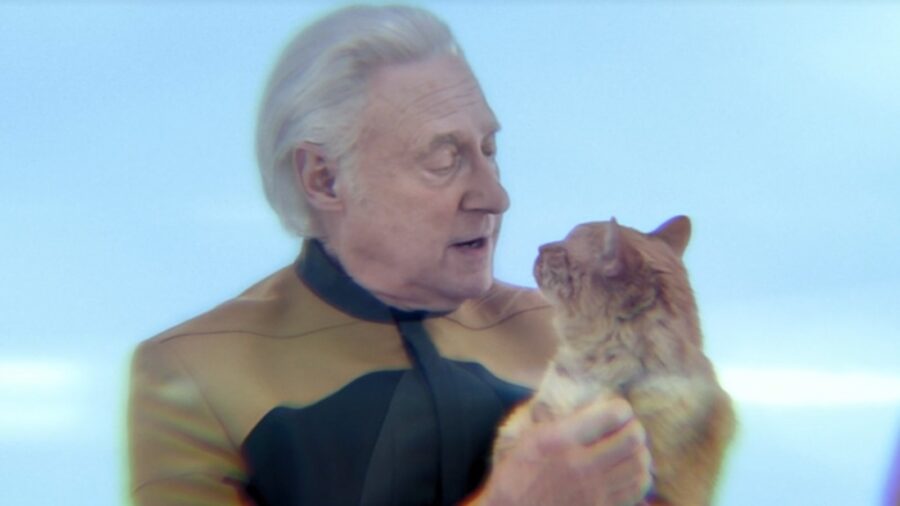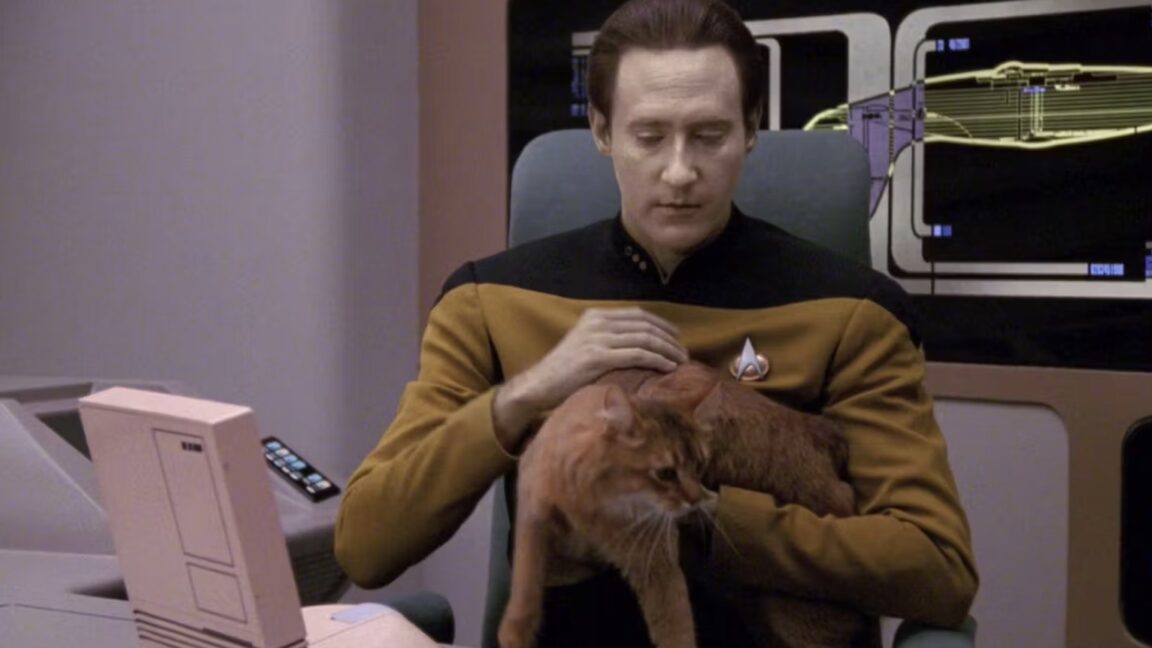While I am glad this ruling went this way, why’d she have diss Data to make it?
To support her vision of some future technology, Millett pointed to the Star Trek: The Next Generation character Data, a sentient android who memorably wrote a poem to his cat, which is jokingly mocked by other characters in a 1992 episode called “Schisms.” StarTrek.com posted the full poem, but here’s a taste:
"Felis catus is your taxonomic nomenclature, / An endothermic quadruped, carnivorous by nature; / Your visual, olfactory, and auditory senses / Contribute to your hunting skills and natural defenses.
I find myself intrigued by your subvocal oscillations, / A singular development of cat communications / That obviates your basic hedonistic predilection / For a rhythmic stroking of your fur to demonstrate affection."
Data “might be worse than ChatGPT at writing poetry,” but his “intelligence is comparable to that of a human being,” Millet wrote. If AI ever reached Data levels of intelligence, Millett suggested that copyright laws could shift to grant copyrights to AI-authored works. But that time is apparently not now.
Data’s poem was written by real people trying to sound like a machine.
ChatGPT’s poems are written by a machine trying to sound like real people.
While I think “Ode to Spot” is actually a good poem, it’s kind of a valid point to make since the TNG writers were purposely trying to make a bad one.
Lest we concede the point, LLMs don’t write. They generate.
What’s the difference?
Parrots can mimic humans too, but they don’t understand what we’re saying the way we do.
AI can’t create something all on its own from scratch like a human. It can only mimic the data it has been trained on.
LLMs like ChatGP operate on probability. They don’t actually understand anything and aren’t intelligent. They can’t think. They just know that which next word or sentence is probably right and they string things together this way.
If you ask ChatGPT a question, it analyzes your words and responds with a series of words that it has calculated to be the highest probability of the correct words.
The reason that they seem so intelligent is because they have been trained on absolutely gargantuan amounts of text from books, websites, news articles, etc. Because of this, the calculated probabilities of related words and ideas is accurate enough to allow it to mimic human speech in a convincing way.
And when they start hallucinating, it’s because they don’t understand how they sound, and so far this is a core problem that nobody has been able to solve. The best mitigation involves checking the output of one LLM using a second LLM.
Parrots can mimic humans too, but they don’t understand what we’re saying the way we do.
It’s interesting how humanity thinks that humans are smarter than animals, but that the benchmark it uses for animals’ intelligence is how well they do an imitation of an animal with a different type of brain.
As if humanity succeeds in imitating other animals and communicating in their languages or about the subjects that they find important.

“In a way, he taught me to love. He is the best of me. The last of me.”
The title makes it sound like the judge put Data and the AI on the same side of the comparison. The judge was specifically saying that, unlike in the fictional Federation setting, where Data was proven to be alive, this AI is much more like the metaphorical toaster that characters like Data and Robert Picardo’s Doctor on Voyager get compared to. It is not alive, it does not create, it is just a tool that follows instructions.
The main computer in Star Trek would be a better demonstration.
For some reason they decided that the computer wouldn’t be self away AI but it could run a hologram that was. 🤷🏼♂️
They need something that executes their orders without questioning them.
The United States would be better with a lot more toasters.

That’s the best poem about a 4-legged chicken that I’ve ever read.
I intentionally avoided doing this with a dog because I knew a chicken was more likely to cause an error. You would think that it would have known that man is a fatherless biped and avoided this error.
What’d you say about my dad??
I think Data would be smart enough to realize that copyright is Ferengi BS and wouldn’t want to copyright his works
Although he’s apparently not smart enough to know what obviate means.
This one’s easily explained away in-universe though-- not enough people knew the original definition so it shifted meaning in 3 centuries.
Freedom of the press, freedom of speech, freedom to peacefully assemble. These are pretty important, foundational personal liberties, right? In the United States, these are found in the first amendment of the Constitution. The first afterthought.
The basis of copyright, patent and trademark isn’t found in the first amendment. Or the second, or the third. It is nowhere to be found in the Bill Of Rights. No, intellectual property is not an afterthought, it’s found in Article 1, Section 8, Clause 8.
To promote the progress of science and useful arts, by securing for limited times to authors and inventors the exclusive right to their respective writings and discoveries.
This is a very wise compromise.
It recognizes that innovation is iterative. No one invents a steam engine by himself from nothing, cave men spent millions of years proving that. Inventors build on the knowledge that has been passed down to them, and then they add their one contribution to it. Sometimes that little contribution makes a big difference, most of the time it doesn’t. So to progress, we need intellectual work to be public. If you allow creative people to claim exclusive rights to their work in perpetuity, society grows static because no one can invent anything new, everyone makes the same old crap.
It also recognizes that life is expensive. If you want people to rise above barely subsisting and invent something, you’ve got to make it worth it to them. Why bother doing the research, spend the time tinkering in the shed, if it’s just going to be taken from you? This is how you end up with Soviet Russia, a nation that generated excellent scientists and absolutely no technology of its own.
The solution is “for limited times.” It’s yours for awhile, then it’s everyone’s. It took Big They a couple hundred years to break it, too.
While I’m completely agreed, the amendments came after the rest, hence the name. :)
Yes, hence I referred to them as “afterthoughts.” James Madison and company drew up the articles (he didn’t create it alone but I think it’s in his handwriting), it wouldn’t pass as-is without ten amendments, it passed, more or less the current federal government was in place, and since 17 (very nearly 18) more have been added for a modern total of 27, two of them extremely stupid.
It also recognizes that life is expensive. If you want people to rise above barely subsisting and invent something, you’ve got to make it worth it to them. Why bother doing the research, spend the time tinkering in the shed, if it’s just going to be taken from you?
Life is only expensive under capitalism, humans are the only species who pay rent to live on Earth. The whole point of Star Trek is basically showing that people will explore the galaxy simply for a love of science and knowledge, and that personal sacrifice is worthwhile for advancing these.
Walk out into the wilderness and make it on your own out there, tell me how much manpower you have to spend keeping your core temperature above 90F. It takes a lot of effort keeping a human alive; by yourself you just can’t afford things like electricity, sewage treatment and antibiotics. We only have those things because of the economies of scale that society allows.
Yeah, capitalism is a bit out of control at the moment, but…let’s kill all the billionaires, kill their families, kill their heirs, kill the stockholders. Let me pull on my swastika and my toothbrush mustache for a minute and go full on Auschwitz on “greedy people.” That the Musks and Gateses and Buffets of the world must be genetically greedy, so we must genocide that out of the population. And we get it done. Every CEO, every heiress, every reality TV producer, every lobbyist, every inside trader in congress, every warden of a for-profit prison, dead to the last fetus.
Now what?
You want to live in a house? Okay. At some point someone built that house. Someone walked out into a forest and cut down the trees that made the boards. And/or dug the clay that made the bricks or whatever. Somebody mined the iron ore that someone else smelted into large gauge wire that someone else made into nails that someone else pounded into the boards to hold them together.
We’re still in the 21st century, there are people on this planet lighting their homes with kerosene lanterns. We still have coal miners, fishermen and loggers. Farming has always been a difficult, miserable thing to do, we’ve just mechanized it to the point that it’s difficult and miserable on a relatively small number of people. Those people probably aren’t going to keep farming at industrial scale for the fun of it.
Star Trek, especially in the TNG era, shows us a very optimistic idea of what life would be like if we had not only nuclear fission power, not only nuclear fusion power, but antimatter power. The technology to travel faster than the speed of light and an energy source capable of fueling it, plus such marvels as the food replicator and matter transporter. The United Federation of Planets is a post-scarcity society. We aren’t. Somewhere on this planet right now is a man hosing blended human shit off of an impeller in a stopped sewage treatment plant so he can replace the leaking shaft seal. We use a man with a hose for this because it’s the best technology we have for the job. We do the job at all because if we don’t, it’ll cause a few million cases of cholera. Who do you think should pay for the hose that guy is using?











